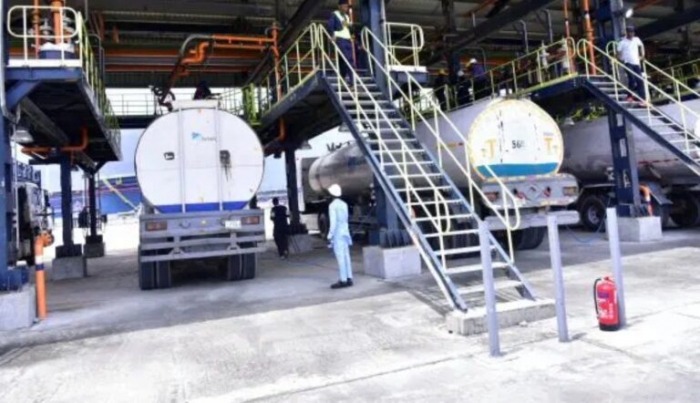The Dangote Petroleum Refinery has unveiled a fuel distribution programme that will deliver petrol and diesel across Nigeria with free transportation, starting August 15, 2025.
According to a company statement, the initiative targets marketers, petrol station dealers, manufacturers, telecom operators, aviation firms, and other large-scale users. As part of the plan, Dangote has acquired 4,000 CNG-powered tankers and will deploy over 100 tankers to support CNG “daughter” stations across the country.
The company described the initiative as a move to eliminate logistics costs, enhance energy efficiency, and contribute to economic development. It also includes a credit facility: buyers who purchase 500,000 litres of fuel can access an additional 500,000 litres on credit for two weeks, backed by a bank guarantee.
The refinery said the offer is expected to lower fuel costs, stimulate job creation, revive dormant filling stations, support SMEs, and improve energy access in underserved areas.
A 60-day registration and KYC process runs from June 16 to August 15. Dangote says the scheme reflects its “commitment to affordable energy and equitable distribution” across the country.
Critical Analysis
1. Beneath the Surface: Monopoly Ambitions?
While the gesture of offering free logistics might appear consumer-friendly, it also deepens Dangote’s strategic effort to dominate the downstream sector. By cutting distribution costs, the company undercuts its competitors — a classic price-leverage tactic used in monopoly formation. Once market dominance is secured, pricing power often shifts in favor of the monopolist, with negative long-term implications for competition and consumer welfare.
2. Context: A History of Market Tensions
This move cannot be divorced from the ongoing tensions between Dangote Refinery and existing downstream players, including private fuel importers and state-run NNPCL. There has been stiff resistance from these players to Dangote’s pressure on the federal government to halt fuel imports. The free logistics initiative might further weaken competitors’ positions by forcing them to absorb logistics costs — or lose market share.
3. Geography vs. Economics: The Lagos Advantage
Consumption nalysis shows that 43% of national fuel consumption occurs in the South‑West, particularly in Lagos and surrounding states — all located close to the Dangote Refinery. Since both Dangote and many competing depots operate from Lagos, transport costs are already minimal in this zone. Therefore, offering free distribution may not significantly impact fuel prices in this dominant consumption zone, where half of the market lies.
This suggests that Dangote’s free logistics offer may be more symbolic than substantive in its immediate effect on pricing — especially in areas already efficiently served by current players.
4. Competitive Pressure: Response from Rivals Likely
Facing the risk of rapid market erosion, NNPCL and other importers will likely respond with similar offers to protect their share. Price wars, logistics subsidies, and credit incentives may follow. While short-term benefits could accrue to consumers, this pressure could also strain smaller importers, pushing them out and narrowing the field, again raising concerns of market capture by a single player.
Conclusion
The Dangote Refinery’s new fuel distribution strategy is more than a logistics upgrade — it’s a calculated play for market control. With half the country’s fuel consumption concentrated within reach of its Lagos base, the company is leveraging location, scale, and capital to shape the downstream landscape. Policymakers and regulators must ensure that market access remains open and competitive to prevent the rise of a private monopoly in Nigeria’s critical energy sector.
